
MANCHESTER, NH – Public comment during last week’s 90-minute Board of Aldermen meeting set the stage for what would be a dramatic conclusion: A unanimous vote in favor of adjusting language in an existing ordinance to give business owners year-round control over the space outside their doors was vetoed by Mayor Craig.
Her reasoning: She pointed out to board members prior to the vote that the existing ordinance allows for businesses to extend their licenses already, at the discretion of the city clerk. Under section B (1) the existing ordinance reads:
Each license shall be valid from April 1 through October 15 and the hours of operation shall be from 9:00 a.m. to 11:00 p.m. The City Clerk, upon application by a licensee, shall have the discretion to extend the dates and times of operation. [Read the complete ordinance below, Figure 1*]
The change was not necessary, Craig said.
And then, some fireworks.
In the fallout, Ward 3 Alderman Tim Baines, who introduced the failed ordinance, reinforced his mounting frustration, At-Large Alderman Joe Levasseur accused the mayor of exposing the city to legal action from the ACLU, and more than half the board reversed itself from its previous unanimous support of Baines’ ordinance by standing with the mayor.
The meeting was book-ended around the theme of homelessness by the vote at the end, and growing concern at the top of the meeting from several residents and business owners over the city’s need to address homelessness and panhandling, during public comment.
‘Help restore a more hospitable environment’
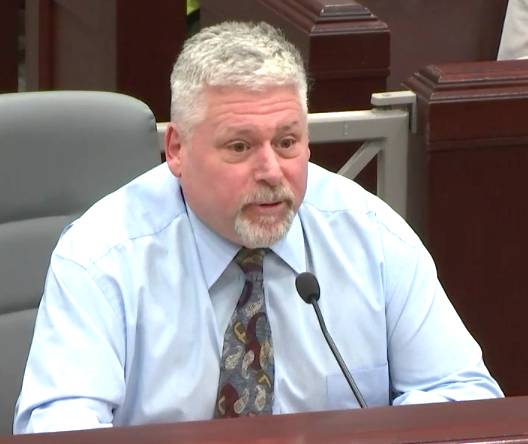
Alan Tolz relayed how he and his wife moved to Manchester last summer from Bedford, to enjoy life in a walkable city, “and all the downtown has to offer.” But Tolz said he doesn’t feel safe.
“We tend to be out and about between 8 and 11 p.m. and my concern is with the growing number of vagrants. Most seem to be homeless with their possessions strewn on the side of Elm, between Lowell and Mechanic streets. If you don’t want to have an interaction with them, you have to move to the ‘darker side’ of the street,” said Tolz. He said if he’s walked from Manchester Place to the center of Elm Street 60 times, he has yet to encounter foot patrol officers.
“If there are ordinances for loitering and public intoxication, they’re not being enforced,” Tolz said. “My wife and I were verbally accosted by a woman screaming obscenities and Bible verses,” he added, noting he’s also dodged a fist-fight between panhandlers arguing over who gets to be where.
Tolz urged the board to add more police shifts for safety officers. “Help restore a more hospitable environment and help us feel more safe,” he said.
‘State Should Step Up’
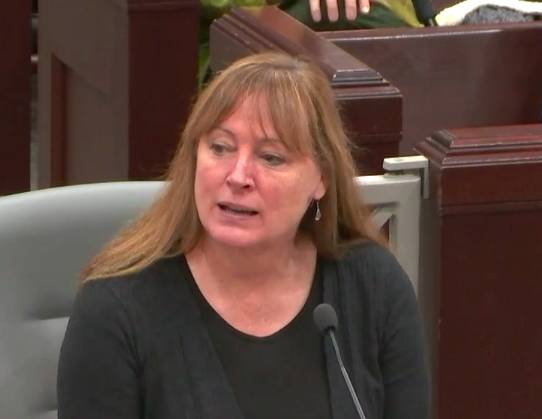
Robynne Alexander, a developer who is revamping a section of Elm Street where the old Raxx billiards operated north of Bridge Street, said she moved from San Diego to Manchester because of the city’s potential. Her take is that the city is carrying an undue amount of the burden for those who come here from around the state for help with addiction services through Safe Station.
According to the 2018 Point in Time count, Hillsborough County is where 52 percent of the state’s homeless population is concentrated – 919 out of 1,767 homeless people. Results of the 2019 Point in Time count, taken Jan. 23 by the NH Bureau of Housing Supports as required by the state Department of Housing and Urban Development are not yet available. In 2017 there were 1,854 homeless persons counted in New Hampshire, with 47.6 percent (818) in Hillsborough County, reflecting a statewide decrease in 2018, but an influx to Hillsborough County.
“From what I understand it’s a Manchester service… and neighboring towns bring their people here and drop them off at fire stations, and now we have extra people to care for on a city budget. I’d encourage staff, aldermen, and the mayor to talk to the state to see how we can expand the Safe Stations across this entire state, so other cities will be able to share in the burden of mental illness, homelessness, vagrancy and panhandling, so our town can flourish and be an example for the rest of the towns in New Hampshire,” Alexander said.
“I’m used to seeing homelessness in San Diego, but the city has a lot of help from state and federal government. This is my home and I care about it and want to protect each and every one of the citizens,” she said. I think the state should step up to help us defeat this problem and reduce the issues. We took an active role in the city of Manchester to create the Safe Station, and some of the unintended consequences are that we’re bringing more vagrants here by way of other cities. It’s not for us to complain, but as citizens, to help provide solutions.”
‘This is a Plea for Help’
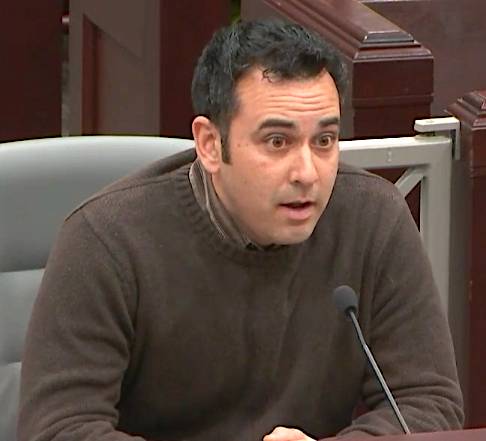
Raji Pal spoke as a property owner and the son of Yesh and Janet Pal, who owned the Chateau of Hanover Street for decades.
“Over the past five years we’ve become completely overwhelmed with the amount of vagrants and traffic from the shelter. It seems as the last speaker [referring to Alexander] mentioned with them coming from so many different areas, there’s not enough support at that shelter to handle everyone who’s coming,” Pal said.
“On a daily basis I’m picking up people’s belongings, they’re defecating all over buildings to a point where one of my tenants has added new lights, and are having trouble getting people to work for them due to conditions they have to walk into,” he said.
“It’s almost a cliche that small business owners wear a lot of hats, but we don’t have the resources, and it’s a collective – me talking with other business and property owners in that immediate area – we need help, this is a plea for help. We cannot do this on our own. We don’t have the resources for it. From what I can see the basic needs of going to the bathroom – there’s nowhere for these folks to go, nowhere to put their personal belongings… and the drug use is another story… but it’s not making it easy to rent to prospective people coming in.”
Lack of Affordable Housing, Non-Tech Jobs

Glenn Ouellette spoke about the need for the city to seek creative solutions to the costly problems of affordable housing and need for more services for the homeless – often a group that suffers from mental illness or drug addiction due to self-medication for untreated ailments.
“I welcome high-tech jobs, but we also need jobs for those who can’t do high-tech, we need jobs for all our residents,” Ouellette said. He said Manchester should look to other cities, like Hartford, CT, or Cambridge, Mass., ” for ideas to help the homeless and help our community, and spending less money. Mental health and drug addiction are causing the homeless population to explode out of control.”
Ouellette also questioned how the shelter is operating beyond capacity.
“There are 76 beds and they’re housing 130-plus. If I had a shelter for 76 people and housed 130 the city would shut me down, fire-wise it’s not considered safe. We need to treat people like human beings. We’re in need of 250 beds and there’s federal funding for it,” Ouellette said.
The Ordinance

The current sidewalk encumbrance ordinance is in effect from April 1-Oct. 15 between 9 a.m. and 11 p.m., when businesses can put out tables and chairs and utilize their outdoor space for customers. Baines’ ordinance as introduced in December removed the dates as a way of giving some relief to downtown business owners who had seen a dramatic increase in the number of homeless people camped out along Elm Street once the ordinance expired in October.
*Figure 1
A few weeks later a letter from the ACLU addressed to Craig and Baines was issued, part follow-up to a November meeting and part warning shot following Baines introduction of the ordinance, during which he explained how it might help address the growing problem of people camping outside of businesses.
Prior to the ordinance vote, Craig reinforced to the board that as currently written, the ordinance allows for business owners to seek permission from the city clerk to extend the sidewalk use.
Baines said he moved for a vote on the ordinance last week because he felt it was long overdue.
His fellow aldermen agreed, and voted 12-0 to support the change, even though the mayor several times pointed out that the current ordinance allows for businesses who pay for the license to use their space year-round with approval of the city clerk.
Craig immediately announced a veto and, in prepared remarks, said approval of the ordinance change would be “reckless” and would “put the city in jeopardy” of a lawsuit at taxpayers’ expense.
Mayor Craig’s full statement on the ordinance veto:
“Addressing homelessness in our community, any community, requires a collective, compassionate and systematic approach – the issue of homelessness cannot be looked at in isolation.
In Manchester, we have a comprehensive system of services, ordinances and statutes which address individual actions in public spaces, and these ordinances and statues are broadly enforced and prosecuted by the Manchester Police Department and the City Solicitor’s office.
Alderman Baines, I appreciate your passion, but approving this change is reckless. As we’ve discussed at several of our meetings, and on numerous other occasions, this particular initiative is a high cost, no benefit proposition. Especially given the timing in that April 1st, the date in which the regular encumbrance ordinance starts, is right around the corner, and the Rochester case is pending.
Our city solicitor has explained the constitutional defects inherent in this approach, and the likelihood of extremely costly legal proceedings. And in a letter dated January 7th, that was addressed to Alderman Baines and I, and was distributed to this board, the ACLU put the city on notice that this is unconstitutional stating “the city is limited in its ability to simply designate certain public spaces – sidewalks for example – as non-public fora by bestowing exclusive use to a private business.” And then went on to site a federal case as precedent.
I don’t know why we would knowingly put the city in jeopardy of another lawsuit which will result in wasting taxpayer dollars. This is a complex issue, and I will continue to work with the board, but I cannot move forward with something we all know puts the city at risk.
I want to let you all know we are making progress on many fronts. I respectfully ask the public and downtown business owners to stop giving people money or food, but rather to refer them to FIT-New Horizons, which is now open during the day, so they can get a healthy meal and the services they need. And lastly, I want to remind everyone, we have a zero tolerance for anyone breaking the law, but we can’t help unless we’re notified. So please, if you see someone breaking the law – doing drugs, committing an assault, completely blocking a doorway or the sidewalk, call the police.”
Craig’s remarks prompted Levasseur to chide her for bringing up homelessness in the context of the ordinance, and he accused her of opening the city up to ACLU action.
“You just laid that whole thing out there, talk about a rookie mistake. It’s the worst thing you could have ever done,” Levasseur said.

Craig asked Solicitor Emily Rice to weigh in on Levasseur’s assertion.
“I think that has not been the concern as I’ve expressed it. People are going to draw their own conclusions, but I don’t think any liability has been created here tonight,” Rice said.
In the end, the mayor’s veto of the 12-0 ordinance vote prevailed by a vote of 6-5-1 – Chris Herbert, Tony Sapienza, Tim Baines, Will Stewart and Keith Hirschmann voted to override the mayor’s veto, while Kevin Cavanaugh, Norm Gamache, Bill Barry, Joe Levasseur, Bill Shea, and Barbara Shaw voted with the mayor. Alderman Elizabeth Moreau and John Cataldo were absent.
Right before Alderman Dan O’Neil abstained from voting to override the mayor’s veto, he quietly but audibly said, “We all want the same thing.”
Different paths, same destination
In January, Alderman approved the mayor’s request for money for New Horizons to help them meet the growing need there, and improve safety. Although capacity is listed at 76 beds, they have been regularly seeing upwards of 130 seeking shelter during the winter months:
- $130,000 in uncommitted Community Development Block Grant (CDBG) funds to be used to construct “safe recovery” areas inside the shelter for those dealing with substance abuse, rehabbing of deteriorated bathrooms, and other safety and service enhancements.
- $70,000 from the Affordable Housing Trust to allow the shelter to remain open during the day and establish a formal outreach program, and provide intensive individual and group management.
- $9,000 from contingency to cover the cost of two ADA-compliant portable toilets in Veteran’s Park for a six-month pilot, including a structure over the toilets and two daily cleanings.
Craig has been working closely with Maureen Beauregard of Families In Transition/New Horizons, along with other service agencies and faith-based organizations, to develop long-term solutions to address the overwhelming need for shelter, low-cost housing, and jobs that can move people from homelessness and poverty into self-sufficiency. Craig has repeatedly stated that homelessness is a “moral challenge” that has existed for years, and that it requires a collaborative approach.
One result has been a task force on homelessness established in February of 40 or so representatives from agencies around the city and officials – including Baines – set to hold a third meeting on March 25. They are focused on four main points of action, Craig said, including prevention, panhandling, services and capacity.
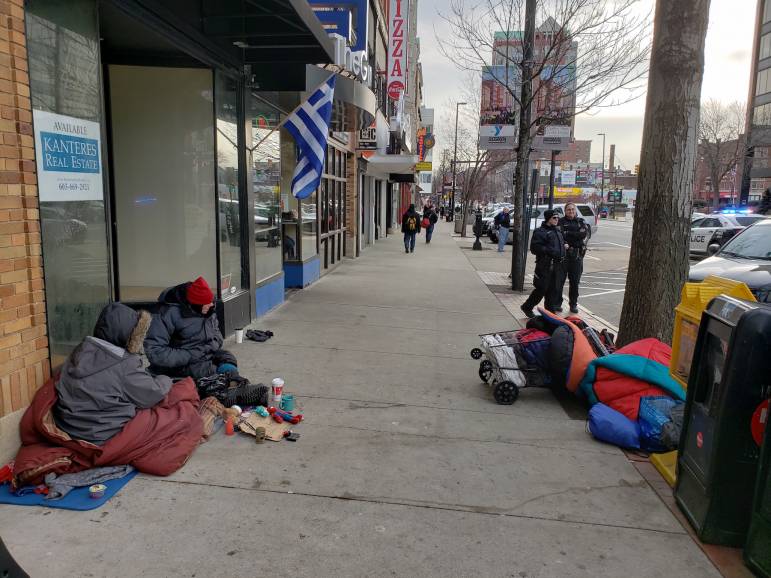
Baines says his perspective on the issue is advised by living and working in the downtown. His car has been broken into twice, his business, once. He fields dozens of calls and emails weekly from constituents who are increasingly frustrated that there seems to be no action, and that Elm Street is not welcoming to patrons of the many businesses and restaurants. He knows most of the “regulars” by name, and their back-stories. He’s sympathetic to their needs.
But as alderman, he says he’s looking for “small points of relief” for those who work and operate downtown businesses, and that the ordinance adjustment might have provided that.
Baines has during several meetings reinforced that he would like to see three things happen: Daily or weekly outreach to the downtown homeless by a team of city representatives equipped to deal with mental health and addiction issues as well as FIT; a community forum to get everyone up to speed on the issues around homelessness and on the same page moving forward; and the ordinance change.
Craig has stated that there are outreach teams already in the field. Baines says in his daily rounds on Elm Street he has yet to see anyone other than faith-based organizations.
They agree to disagree.
On the Veto and the Override

Ward 12 Alderman Keith Hirschmann voted to override the mayor’s veto.
“I didn’t know what to make of that vote. Joe changed his vote. It’s just weird,” Hirschmann said last week. “I didn’t agree with the solicitor’s advice at all. If the clerk has discretion to offer year-round control to businesses, we’re just taking away his discretion and making it permanent. They said our intention would be construed as confining their liberties, but I don’t agree with the whole thing. We have all these laws to protect people’s right to be on the street, and we’re not able to walk up to someone laying on the ground when it’s 12 degrees out, passed out, to tell them to move along or get them help? It makes no sense to me.”
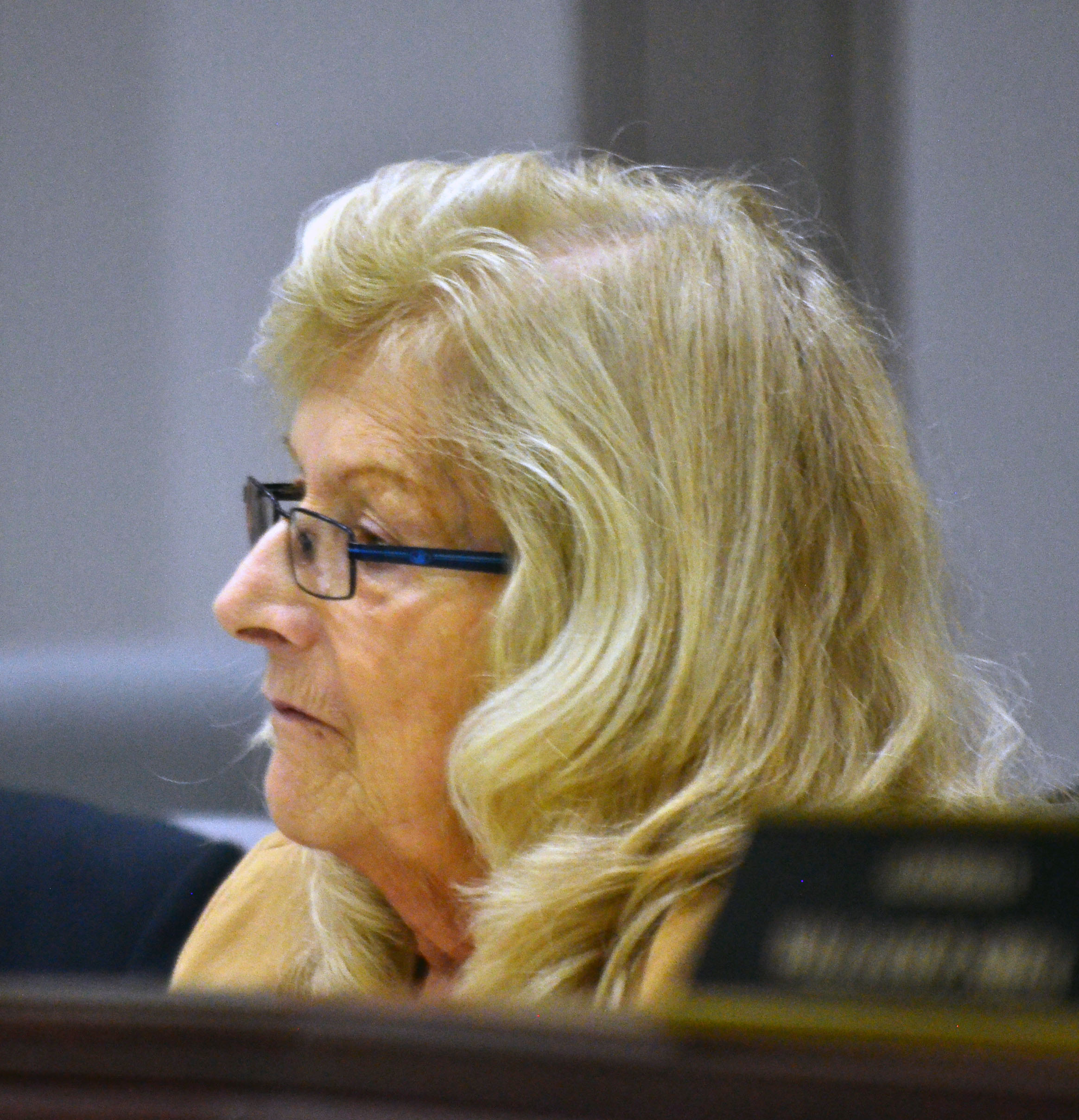
Barbara Shaw of Ward 9 said she favored the ordinance change, but felt that overriding the mayor’s veto would be like opening Pandora’s box.
“We already have a chance to extend the permitting so that business owners own a little extra of their space, and even though I wanted to make it permanent, I don’t want to invite the ACLU to hit us with a lawsuit, and chance spending taxpayer money on things we shouldn’t,” Shaw said.
“And I do see progress with the task force on homelessness, although I also feel there should be more action steps now. Something’s got to be done with the big picture of homelessness. I’m optimistic the task force will come up with some solutions, but I’m not counting on it. Hopefully they’ll move quickly and make some positive changes to help the downtown get some relief from the influx of homeless people,” Shaw said.
“I’m afraid it’s almost an unchangeable situation until we have better facilities and more workforce housing and rooming houses where these people can afford to go,” said Shaw. “The average cost of an apartment in our city is more than $1,000, it’s literally unbelievable to me. You can’t find a place for $500-600 like you used to. Anyone working minimum wage – even 10-12 dollars an hour – cannot afford $1,200 for an apartment. I know I couldn’t. If I got put out of my house I’d have to live with one of my kids.”

Ward 5 Alderman Tony Sapienza voted in favor of the ordinance change and also voted to override the mayor’s veto.
“As you know I walk downtown quite often, and it’s a major problem,” he says. “I haven’t seen the worst of what I’ve heard others talk about, but I see people sleeping, or stoned. They used to ask me for money, but they don’t bother anymore. I guess I have a reputation as someone who doesn’t give money. But it’s gotten to the point where not only do we have to do something, we have to do everything we can. All we’re really talking about doing is extending the deadline of what we do in summer, spring and fall, and I saw no harm. It gives business owners some control over their sidewalk,” Sapienza said.
As for the veto, he said he doesn’t understand why only four alderman of the 12 who voted in favor of the ordinance voted to override.
“I was puzzled. The mayor’s veto didn’t contain any new information. I don’t know what those others learned in those few minutes, or why they changed their vote,” he said.
“This problem we have, you know, we destroyed the homeless camps down by the river last year. That’s why this problem has escalated in recent months. Nobody talks about that,” Sapienza said.
“People think there are magic bullets, by sending the police in – police have explained to us that the pesky Constitution – which I appreciate, and I won’t disparage the Constitution or the ACLU – but it’s never popular when it won’t let you do what you want.”
ACLU vs. Cities and Civil Liberties
In November Gilles Bissonnette, Legal Director for ACLU-NH, met with the mayor, Baines and other city leaders to talk about the challenges Manchester is facing.
As mentioned above, Bissonnette sent a three-page letter to the city in January of 2019 in which he outlined steps the city should pursue that would not infringe upon the rights of the homeless, including:
- Increasing funding and capacity for mental health services and Substance Use Disorder treatment
- Support systems for victims of domestic violence
- Policies which increase the availability of affordable housing
- Robust enforcement of laws prohibiting discrimination in housing, including the Fair Housing Act
- Increased community police patrols in the areas where individuals are congregating in public places, as such an approach would be tailored to any concerns that may exist concerning the presence of criminal activity
- Enforcement of littering ordinances where appropriate (Manchester Code 91.68, 91.73); and
- Enforcement of laws governing criminal harassment (RSA 644:4), threatening (RSA 631:4), disorderly conduct (RSA 644:2), assault (RSA 631:2-a), and public urination/defecation (RSA 645:1-a) where appropriate
If the city requested additional state money the ACLU would support the city in that request, and Bissonette endorsed the mayor’s initiative for the funding requests granted by aldermen to fix up the shelter and keep it open during the day.
The ACLU letter is below:
During the March 5 meeting, Craig mentioned the “Rochester decision,” a case now pending in the NH Supreme Court. In March of 2018 Rochester City Council enacted a “no-tenting” ordinance, allowing police to fine homeless individuals $100 for camping or sleeping overnight on city-owned property. The ordinance was intentionally violated by Don McCullough, a retired firefighter who says the ordinance “criminalizes homelessness” and conflicts with the state’s public welfare law. A decision in the case is expected by March 28. The outcome of that case could have far-reaching implications for how cities and towns in New Hampshire move forward with their own ordinances around the rights of the homeless.
Manchester Chief Carlo Capano last Friday said that he will enforce the law, whether it’s written to cover a portion of the year or year-round.
“As long as I can legally act on any prohibitive behavior, I’m going to,” Capano said.
That is the rub.
Public perception may be that police aren’t doing enough, but even with a year-round sidewalk encumbrance permit, once a business closes at 9 p.m., and the tables and chairs are removed from the sidewalk, people have a right to be there.
“The hurdle we have as Manchester Police Department through legal counsel is that if a business is not open, I’m hard-pressed to do any kind of legal action. We can’t write summonses for being on a sidewalk,” Capano said.
“Now if you do have a business out there during business hours and they have chairs and tables out, and people are congregating who aren’t paying customers, and a business asks them to move on and then calls to say people are taking up my seats and won’t move on, we can issue them a summons,” Capano says. “I’m allowed to enforce the ordinance right now, as there’s no timeframe on it now that [the city clerk] has opened that up.”
He said it is frustrating to hear people say there are no officers walking the beat.
Capano notes that he’s assigned a two-person walking patrol to the downtown during evening hours, between Bridge and Merrimack streets, and they are instructed to check in with businesses along the route.
“The idea is to have them there as a deterrent. Plus, we have Officer Anna Martin permanently assigned to the downtown on flex time, and our community officers pay special attention to the downtown,” Capano says. “We have a tremendous amount of resources dedicated there, but we can’t be everywhere at once – it’s frustrating to hear people saying we don’t have officers there.”
According to John Grabe, a law professor at UNH and Director of the Warren B. Rudman Center, the legal and practical issues Manchester is grappling with are tricky ones.
“It’s one thing to ban solicitation during the busy times when people are coming in and out of businesses – that’s the thing, the law does recognize rights to limit the time, place and manner of speech. So, as long as that’s done without respect to the content of the speech, and that there are reasonable alternatives, that doctrine is far more deferential to cities when they regulate, if not doing so on the basis of content,” Graebe says.
“I don’t want to suggest the law is clear one way or another, but based on certain facts, cities can impose reasonable time, place and manner restrictions as long as they leave open other times,” Graebe says. “Could you write a law that doesn’t refer to panhandling, but specifies certain areas to be kept clear at certain times? Is it possible to write such a law that doesn’t become so vague it limits constitutional problems? So much turns on how the law is crafted, so a broad law would mean nobody can be asking anybody about anything outside restaurants on city property, and would be unconstitutional,” Graebe says.
“Another thing to consider is that the ACLU suing someone doesn’t mean they will win – and I’ve partnered with the ACLU on other cases, for full disclosure, but ultimately, that’s how the law gets clarified over time, when people decide enough is enough. A judge would have to follow the law, but different case facts lead to different outcomes,” Graebe says.
The Way Forward
In the spirit of enough is enough, Baines says he doesn’t plan to fight for the ordinance going forward.
“I thank the city clerk’s office for going out to the 55 businesses and letting them know that they can use their space year round if they want to. I never thought April 1 to Oct. 15 made a ton of sense, given we can have warm days in February and December. It’s confusing for business owners, with the dates defined,” Baines says. “One reason to push forward is to make it a permanent thing.”
He says he’s complimented the mayor on the homeless task force and thinks she’s assembled an impressive group.
“The dialogue is good, and it’s productive conversations that are overdue in this community. I’m anxious to see what comes of it, but at the end of the day, the issue with vagrants and behaviors impacting quality of life, I’m not sure there’s going to be improvement in that regard from this initiative,” Baines says.
But had adds that he was shocked by the mayor’s veto.
“I was even more shocked that all of the discussion handled in non-public session was brought out by the mayor. I was never a fan of going into those non-public sessions, but we have had lengthy conversations and have been given documents, and the aldermen were to do their own homework. I haven’t been shy about saying the ACLU has, in my opinion, been over-stepping and they’ve shaken some department heads to their core. There are multiple people in city government who aren’t doing what’s right in fear of lawsuits, and it’s not good governance,” says Baines.
“It’s worth reiterating that 12 alderman received all the same info and there was not even close to sufficient information for a lawsuit. If one came, it would have lost with any fight from our city attorney. When the mayor laid out all the non-public information, which violates our city charter, it was Levasseur’s comments that swayed the override vote and, in fact, if the city sued us, they would have read her statement,” Baines says.
“I don’t believe the ACLU would sue over changing dates on the ordinance – and if they did, I think they would have been exposed as overstepping what their true mission is,” Baines says.
When asked Friday about the constraints of non-public meetings on the issues, Solicitor Rice said that the attorney-client privilege applies to her and that it’s not up to her to waive that privilege.
“There has been a lot of public discussion – social media, print media, small and large discussions and the task force,” Rice said. “I’m in a unique position, as attorney-client privilege applies to me. It’s not up to me to waive that privilege. I’m duty-bound to uphold that until someone wishes to waive it,” Rice says. “It’s not any secret where the question of legal advice has come up, I almost always say that I believe the discussion should not take place in public session. If a client does not wish to preserve the privilege they have a choice to waive it.”
Rice says the main purpose of a non-public session is to allow for a “robust and free-ranging discussion” so an attorney can give the best possible advice.
Craig says she gives credit to Baines, as further review of the existing ordinance was what brought to light that, as written, it’s sufficient. An ordinance change was unnecessary, period.
But she also says it was his comments during the December alderman’s meeting that opened the city up to scrutiny by the ACLU, by linking the ordinance to homelessness.
“I’m trying to make logic out of why he’s pushing this. We have an ordinance in place that in effect does exactly what was being proposed, without putting the city in a legal battle with anybody,” says Craig.
“As we’ve said a number of times, addressing homelessness is a complex issue. It’s something we’ve been working hard on – my office, the business community, Intown Manchester, the Chamber – we’ve made some significant changes. In addition to the funding for New Horizons, Chief Capano has foot patrols, and even added SROs last week while school was out. We’re focused on critical components to how we address homelessness and not just move people around,” Craig says.
The narrative that active steps aren’t being taken is fake news. More people than ever are actively engaged in finding workable long-term solutions for all.
“The critical answers we’re working toward are based on understanding what do we need to do to prevent this from happening. I can’t stress enough how impressed I am with this community working together with great ideas. There’s a lot going on, and a lot of good,” Craig said. “This is an issue the city has been grappling with for many years, and as mayor, I need to protect the taxpayers and make sure what we’re proceeding with is not putting us in jeopardy of a significant financial lawsuit,” Craig says.
Editor’s note: The story has been updated as of March 11 at 10 a.m. to include additional and clarifying comments from Chief Capano, Solicitor Rice, Mayor Craig, Alderman Baines, and the addition of the full city ordinance.







